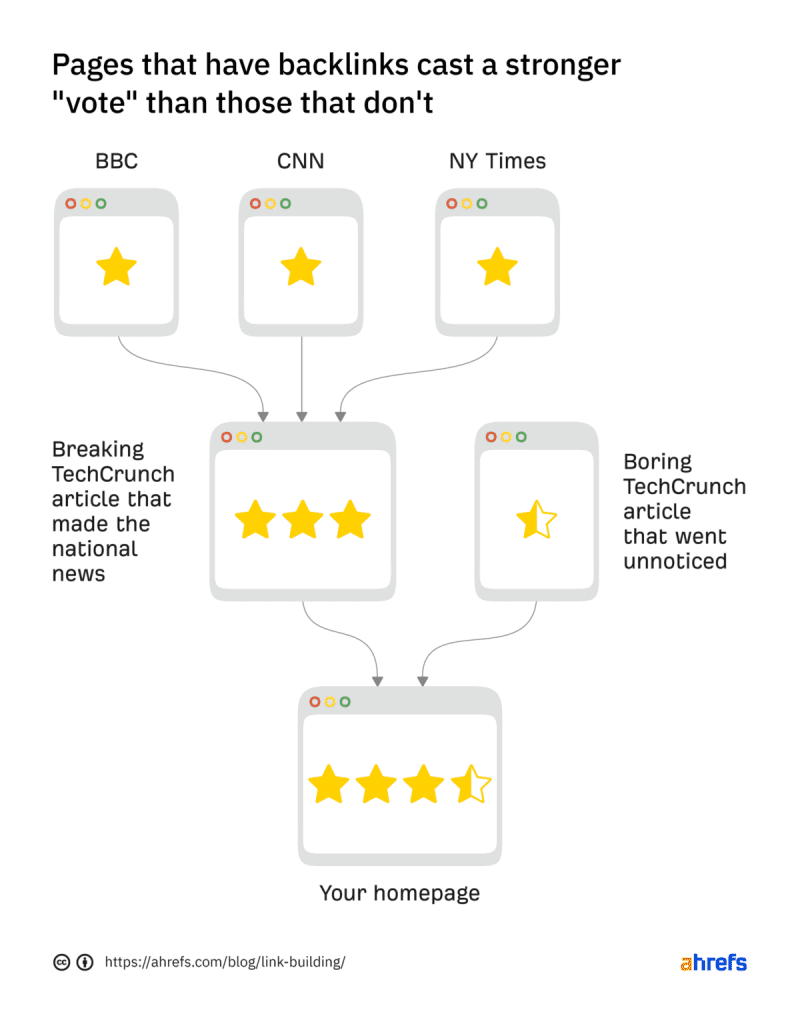How Getting Links To Your Site Can 10x Your Business’ Reach
Link building is one of the most effective ways to improve a website’s ranking on search engines.
I’ve seen the impact of acquiring a handful of backlinks for my business websites first-hand. Just a few weeks after securing a high-authority link, I noticed my blog posts gradually climbing the search engine rankings.
It didn’t take long before I observed a significant uptick in traffic to my landing page, resulting in higher conversion rates of visitors into paying customers than I had ever experienced before.
While link building is an incredibly powerful way to build your site’s credibility and improve your business’ search rankings, you need to be careful to ensure that you’re not breaching Google’s search guidelines.
This blog post will guide you through the process of safely building links to your site.
This is the final post in our five-part series on the fundamentals of SEO. If you’ve missed the first four posts, we’d recommend that you read these before getting started.
- SEO Basics: The fundamental concepts and terminology necessary to improve your site’s search rankings.
- Keyword Research: Find which keywords people search for.
- Content Creation: Creating blog content that people are searching for.
- Page Optimisation: Optimise the content of your page to be picked up by search engines.
- Link Building (Current Post): Build trust and authority for your site by adding links from other websites.
If you’re more of a watcher than a reader, check out this great video by Exposure Ninja, where you’ll learn how to get backlinks, even if your business isn’t targeting a trending niche.
What is Link Building?
Link building is the process of acquiring links to your website from other pages online.
It is a fundamental aspect of SEO as it can help your business boost its online visibility, increase website traffic, and improve search engine rankings. Link building is not just about getting as many links as possible; it is about getting quality links from relevant and authoritative sources.
Why Should I Do Link Building For My Business?
Link building can improve your business’ site’s SEO in many ways.
- Improves Search Engine Ranking: Link building is one of the most effective ways to improve your website’s search engine ranking. Search engines consider the number and quality of external links pointing to your website as a sign of its credibility and relevance. So having quality links from authoritative and relevant sources can significantly improve your website’s search engine ranking.
- Increased Traffic: When a user clicks on a link that leads to your website, it is known as referral traffic. Referral traffic is an essential metric for businesses, as it shows that users are interested in your content and are willing to explore your website further.
- Builds Authority: Building links from relevant and authoritative sources can significantly increase your brand authority. When your website is linked to by other credible and trustworthy websites, it indicates to search engines and users that your website is a reputable source of information in your industry.
- Increased Social Media Visibility: Link building can also help to improve your visibility on social media platforms. When your website is linked to by other websites, it can increase the likelihood of users sharing your content on social media platforms.
Link Building for Startups – How Can I Do It?
There are three commonly accepted white hat (the ethical and legitimate optimisation techniques that comply with search engine guidelines) link-building techniques: adding links, requesting links and link earning.
Adding Links
The simplest (and least effective) technique to link building, called Adding is where you manually place links to your site on other websites.
This can be done on business directory submissions, social media profiles, blog comments, forum posting, etc.
While this link-building strategy is the quickest and easiest to do, it is seen as a low-quality link in the eyes of Google, and may even be flagged as spam which will harm your site’s reputation.
However, even though it may not be as beneficial for creating backlinks as the other methods listed below, adding your site to relevant forums and business directories can be an incredibly beneficial method of growth.
If you’d like to learn more, check out our creative marketing ideas to boost your startup.
Requesting Links
This strategy can be an incredibly effective tool for building backlinks to your site.
This method involves reaching out to the owner of the site that you want a link from and giving them a good reason to link to you.
Like any good business agreement, the proposition must be beneficial to both parties. In order to create some value for the site that you want a link from, you could offer:
- Guest Blogging: Create useful content for their site that matches their style of writing
- Link Inserts: Provide a link to a resource on your blog that provides more information into a topic that they have briefly mentioned
- Skyscraper Technique: Show them a resource on your site that is more informative than a link that they are currently using on their site
- Testimonials: Give positive feedback about their product or service
- Ego Baiting: Mention their work positively in one of your blog posts, and encourage them to share the article about them
- Broken Link Building: Identify a broken link on their page and provide a replacement to it with your content
- Image Link Building: If a blog post is using an image that you created, ask for credit
- Unlinked Mentions: Ask that a link is provided to your site if a post is mentioning your business
While this method can be an incredibly effective method at boosting your business’ site’s SEO, it can be incredibly difficult as many site owners don’t find the worth in linking to other people’s content.
As a result, some businesses resort to buying links or performing link exchanges. We don’t recommend that you partake in this, however, as it goes against Google’s guidelines and can result in your site being ranked lower than it was.
Link Earning
Earning links involves publishing such great content that it gets naturally linked to from other sites.
This is an incredibly difficult task given the sheer abundance of content on the web, however, this can be the simplest and most profitable method if you manage to succeed.
The easiest way that I’ve found to passively build links for my businesses is to create statistics pages for relevant keywords surrounding my business. These statistics pages merge both statistics that I’ve researched myself and statistics aggregated from other sites (with appropriate attribution).
I add my own interpretation to the statistics and create my own sharable infographics too, which helps to naturally build links.
How Do I Preserve The Backlinks I Have?
After working so hard to get the backlinks in the first place, the last thing that you want to happen is to lose the links and the boosted search ranking that comes with it.
In order to do this, ensure that none of your pages that have had quality backlinks now shows a 404 page.
You also can perform link reclamation, which is where you monitor your lost backlinks and reach out to the relevant site owner asking for the link to be reinstated.
What Makes A Good Backlink?
While Google doesn’t reveal exactly how it measures the value of a link, there are a number of commonly accepted concepts that can be used to determine how much a backlink boosts your search ranking.
Website Authority

It is commonly accepted that sites have an authority score attributed to them by the major search engines.
While Google denies that this process is in place, many SEOs believe that sites are evaluated by a site authority that impacts the usefulness of a backlink.
If you’re looking to build a high-quality backlink for your site using the steps above, look for a post that is ranking on the top of its search results page and that is hosted on a well-regarded site to achieve the best results.
Relevance
Make sure that the sites and the pages on them that link to you are relevant to the topic that you’re describing in your post.
Google says that links from relevant sites show them that the information is of a high quality, which helps to boost your rankings.
Anchor Text
Anchor text is the visible, clickable text in a hyperlink that links one web page to another. Search engines use anchor text to understand the content of the linked page and determine its relevance and authority.
For example, if the anchor text for a link to a webpage is “best pizza places in New York,” search engines will consider the linked page as a relevant source of information for pizza places in New York.
However, it is important to use anchor text appropriately as manipulative practices, such as keyword stuffing, are frowned upon by search engines and can result in a less useful backlink.
Relationship Attributes

Rel attributes are HTML attributes that are used to provide additional information about the relationship between the linked page and the page containing the link. Including different relative attributes can impact the authority of the backlink. The following tags impact the authority of the backlink:
- Nofollow: The
rel="nofollow"attribute instructs search engines not to follow the link and not to pass on any SEO value from the linked page. Nofollow links are often used for user-generated content, comments, or advertisements to prevent spam and manipulation of search engine rankings. - Dofollow: The absence of a
nofollowattribute indicates that the link is adofollowlink and passes on SEO value to the linked page. Dofollow links are considered more valuable for SEO as they can improve a website’s search engine ranking. - UGC: The
rel="ugc"attribute is used to identify links that are placed within user-generated content such as forums, comments, or reviews. It helps search engines to understand the nature of the content and can impact how the link is evaluated for SEO. - Sponsored: The
rel="sponsored"attribute is used to identify links that are placed as part of a sponsorship or advertising agreement. It helps search engines to understand the nature of the link and can impact how it is evaluated for SEO.
In general, you want to aim to be getting dofollow links as these provide the strongest authority. However, any type of link from a high-quality source is better than nothing, so it’s definitely worth getting a link even with a different relationship attribute.
Link Placement
Google’s reasonable surfer patent shows that the likelihood of a link being clicked could be linked to how much authority the link has. One of the main aspects that impacts click-through rate (CTR) is the location of a link on the page.
To improve the CTR, make sure that your link is:
- Near the top of the page
- Is located in the main content of the page (not the footer, sidebar etc)
- Is displayed in a readable font
6 Strategies For Startup Link Building
Inspired by Exposure Nija’s video (linked at the top of the post), here’s 6 strategies that you can use to build links for your business, no matter what niche you’re in.
Strategy 1: Elevate Your Content
One of the primary reasons businesses struggle to secure backlinks is their website content often mirrors their competitors.
To change this, you must create content that’s worth linking to. Think about the questions your audience may have or broader topics related to your industry that the public would find interesting.
]For instance, Trellaborg, in the business of polymer seals, could create engaging content about different sealant types and their applications. Make your content comprehensive, informative, and visually appealing, incorporating rich media like images, videos, and infographics.
Strategy 2: Guest Posting for Industry Publications
Pretty much all industries have dedicated trade journals and magazines. These publications need fresh content regularly. By offering to contribute articles or insights related to your industry, you can secure valuable backlinks.
Research the topics covered by these publications, pitch ideas, and emphasize how your expertise can provide valuable perspectives.
For instance, if you’re a legal expert specializing in small business claims, approach small business publications with articles on legal advice tailored to their audience.
Strategy 3: Hunt for Unlinked Brand Mentions
Unlinked brand mentions occur when someone mentions your business online but forgets to include a hyperlink to your website. These mentions are goldmines for SEO.
Use tools like Google Alerts to track mentions of your brand. When you find unlinked mentions, reach out to the content creators and politely ask them to add a link to your site. Your persistence can pay off in the form of valuable backlinks.
Strategy 4: Use Digital PR
Turning data into newsworthy stories can be your secret weapon for digital PR.
Look for interesting data points related to your field and turn them into newsworthy stories.
Clario, a cybersecurity company, is a prime example. They analyzed data about technology platforms and personal data usage, turning it into an engaging infographic. This initiative garnered them 6,000 backlinks and massive traffic.
Strategy 5: Create Buzz with Publicity Stunts
Sometimes, all it takes is a memorable publicity stunt to generate buzz and secure high-profile backlinks.
Trellaborg’s Guinness World Record for producing the largest O-ring is a perfect example. They laid a massive O-ring around Chouk’s Bri Abbey and earned a link from Wikipedia.
While not all stunts will land you on Wikipedia, creativity can go a long way in securing attention and backlinks.
Strategy 6: Supplier, Distributor, and Retailer Links
Leverage your business relationships with suppliers, distributors, and retailers to acquire backlinks. If these partners mention your business or use your logo on their websites, kindly ask them to include a link back to your site.
Additionally, consider offering compelling testimonials to software providers, marketing agencies, and other service providers you collaborate with. Your testimonials, accompanied by backlinks, can become a win-win for both parties.
Overview
Now that you understand how to effectively build backlinks to your site, have a look at the 5 core elements of a successful startup.
Or, if you’ve missed one of the previous posts in our SEO series, why not catch up?
- SEO Basics: The fundamental concepts and terminology necessary to improve your site’s search rankings.
- Keyword Research: Find which keywords people search for.
- Content Creation: Creating blog content that people are searching for.
- Page Optimisation: Optimise the content of your page to be picked up by search engines.
- Link Building (Current Post): Build trust and authority for your site by adding links from other websites.







